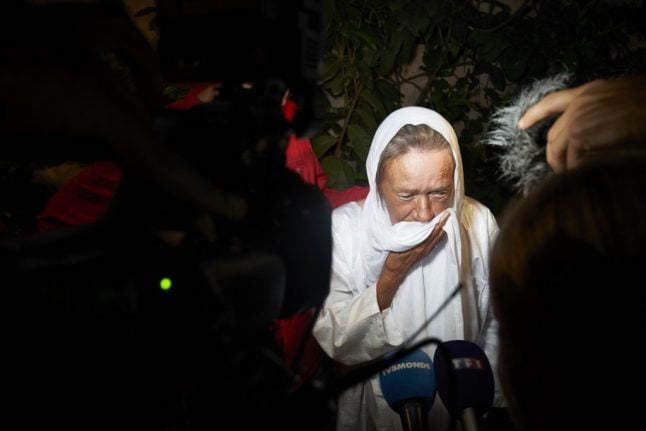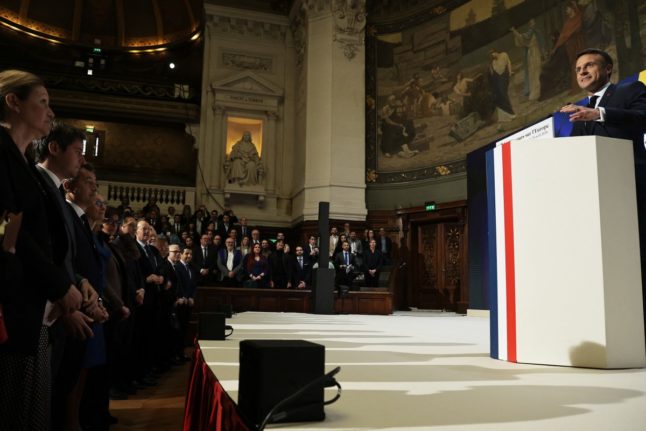A white-robed Sophie Petronin, 75, the last French citizen known to be held hostage anywhere in the world since her abduction in 2016, was embraced by her son as she touched down in Mali's capital, Bamako.
Politician Soumaila Cisse, a three-time presidential candidate and former opposition leader, was also hugged by loved ones and greeted by cheering crowds on his way home.
“It was a difficult period, but it has been overcome,” the white-robed Cisse, 70, told AFP.
Italian priest Pier Luigi Maccalli, who was abducted in neighbouring Niger in 2018, and Nicola Chiacchio, who went missing last year during a solo bicycle trip, were also freed.
Mali's government has not revealed the circumstances of the releases, which follow talks with the hostage-takers. Malian authorities freed more than 100 prisoners over the weekend.
Sophie Pétronin est libre.
Retenue en otage depuis près de 4 ans au Mali, sa libération est un immense soulagement. À sa famille, à ses proches, j'adresse un message de sympathie. Aux autorités maliennes, merci. Le combat contre le terrorisme au Sahel se poursuit.
— Emmanuel Macron (@EmmanuelMacron) October 8, 2020
After first emerging in northern Mali in 2012, a brutal jihadist insurgency has spread to the centre of the country as well as Burkina Faso and Niger.
Thousands of soldiers and civilians have died in the conflict and hundreds of thousands have been displaced. Kidnappings are also common.
French President Emmanuel Macron voiced “immense relief” at the release of Petronin, and said he would welcome her back to France.
A frail-looking Petronin, who is known as 'Mama Sophie' and dedicated years of her life to a charity for malnourished children, was twirled in a cirle by her son, Sebastien Chadaud, as she descended from the plane.
Footage shared on social media also showed the mother and son with their foreheads pressed together, with Petronin telling him: “You were there by my side telling me, hang in there.”
The government's move to free prisoners over the weekend had sparked speculation of a swap for her and Cisse.
In an unexpected development, the prime minister's office also announced Thursday that two Italian nationals had also been freed. It was not immediately clear whether they had arrived in Bamako on the same flight.
Petronin was abducted by gunmen on December 24, 2016, in the northern city of Gao, where she worked for the children's charity.
Cisse was kidnapped on March 25 while campaigning in his home region of Niafounke, central Mali, ahead of parliamentary elections.
Italy's Prime Minister Giuseppe Conte, Defence Minister Lorenzo Guerini and Foreign Minister Luigi Di Maio all hailed the release of the Italians, who Di Maio said were well.
Speaking to reporters, Petronin thanked the Malian and French governments for their help in securing the release.
“For Mali, I will pray and implore the blessing and the mercy of Allah, because I am a Muslim,” she said.
“You say Sophie, but it's Mariam, you have before you,” she added.
Petronin appeared in good spirits following her release, despite concerns about her health after a 2018 hostage video showed her looking emaciated.
The footage triggered alarm among her family members, who pressured Macron to negotiate with her captors.
France's president several times said his services were working “tirelessly” for Petronin's release.
“To her family, to her loved ones, I send a message of sympathy,” Macron tweeted, adding: “The fight against terrorism in the Sahel continues”.
Mali's former colonial power France has 5,100 soldiers deployed across the Sahel as part of its anti-jihadist Operation Barkhane.
One of the hostage negotiators, who requested anonymity, told AFP that the talks remained difficult to the end.
On Thursday, Mali's prime minister's office said the four hostages had been held by the Group to Support Islam and Muslims.
The alliance comprises several jihadist groups aligned to al-Qaeda, and has claimed responsibility for some of the biggest attacks in the Sahel.
Cisse told reporters that he had been informed of his imminent freedom on Monday. What happened between then and Thursday is unclear.
The prisoner release came with an interim government due to govern Mali for 18 months before staging elections, after a military junta overthrew president Ibrahim Boubacar Keita in August.
The kidnapping of former opposition leader Cisse was one of the factors that fuelled popular protests leading to the ouster of Keita over his perceived inability to crush the Islamist insurgency.
The intermediary involved in the negotiations told AFP on Thursday that releasing the prisoners was necessary.
“Yes, terrorists were released,” he said. “We had to obtain the release,” he added.
Several other hostages remain detained by militant groups in the Sahel.



 Please whitelist us to continue reading.
Please whitelist us to continue reading.
Member comments